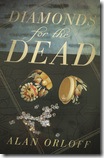Thanks Elizabeth, for hosting me on your (terrific) blog. I’ll try not to alienate any of your regular readers.
Every writer has his or her own unique style/method/routine. There’s not a right way or a wrong way–only your way.
Here’s my method for writing the first draft. Maybe you’ll find something here to help you (I won’t be offended if you decide that doing the exact opposite is your best course of action!).
After I’ve completed my (fairly sparse) outline and drawn up character sketches for the main four or five characters, the prep work is done. Now it’s time to park my butt in the chair and start grinding out the words.
And that’s what it is for me–a grind.
My only goal is to meet my daily word quota. I’ve been known to walk away from my computer in the middle of a sentence, if I’ve nailed my quota.
First, I’ll reread the last few paragraphs to see where I am. If I’m beginning a new scene, I’ll make a few notes. What is my purpose in the scene? How will I drive the narrative forward? Who will be in the scene? Where will it be set? I want to have an idea of where I’m headed. My key concern is the scene’s conflict. No matter what else happens, it’s got to have some conflict, however forceful or subdued, overt or covert (yes, inner conflict counts, at least in my books).
Then I’ll start writing. The first paragraph is key. I try to set the scene in an engaging way and imbue the sentences with a good rhythm. I may take a few extra moments to make sure I’ve got it in reasonably good shape, then I’m off to the races.
I trust myself to write a decent first draft. I think this trust is important because it gives you “permission” not to be perfect. You don’t have to go back and make sure everything is exactly how you want it the first time through. Repeat after me: “That’s what the revision process is for.”
As I write, I’ll correct obvious misspellings and bad grammar, but I try not to spend much time on what I’ve already written–I’m focused on what’s ahead. Ever forward. Words, words, words. It’s all about the words.
If I bump into a fact I need to know but don’t, I’ll type “XXX” and keep going. I don’t want to interrupt my flow to look something up, and I don’t want to waste precious minutes lost in some crazy Internet search for the capital of Mongolia (and my, what cool traditional garb the Mongolians wear, and look, isn’t that a neat recipe for Mongolian stew, and is there a place called Inner Mongolia, and, boy, I sure could go for some Mongolian barbecue right about now, and...). I need to keep my eyes on the goal. (Super Tip: Turn off the Internet when you write, or allow yourself only three minutes per hour to check email.)
If I know, right then, that something will need attention, I highlight it in red. Ditto if I make a note to myself. Otherwise, I plow on (in the picture above, that’s me, dressed in my typical writing outfit, working the plow, imploring my muses to mush).
Every so often, I’ll check my word count. If it’s less than my goal (usually 1500 – 1750, depending on what I’m working on), I’ll keep going. If I’ve achieved my goal…I hit the save button and move on to something else.
Usually lunch.
 Alan Orloff’s debut mystery, DIAMONDS FOR THE DEAD, will be published in April by Midnight Ink. The first in his new series, KILLER ROUTINE – A Last Laff Mystery, featuring Channing Hayes, a stand-up comic with a tragic past, will be out Spring 2011 (also from Midnight Ink). For more info, visit www.alanorloff.com
Alan Orloff’s debut mystery, DIAMONDS FOR THE DEAD, will be published in April by Midnight Ink. The first in his new series, KILLER ROUTINE – A Last Laff Mystery, featuring Channing Hayes, a stand-up comic with a tragic past, will be out Spring 2011 (also from Midnight Ink). For more info, visit www.alanorloff.com


Hmmm — I think I got caught up in the Mongolian search a couple of times myself. Research is a major pitfall for me. You’re giving great advice when you tell us not to stop in the middle of a writing session to look something up. I also use the XXX signal and highlight it in yellow to remind me to fill in the blanks later.
Alan – You offer really helpful advice here! I think the one thing you mention that really resonates with me is to forgive oneself for not writing a perfect first draft. Like you, I edit obvious mistakes as I go, but I do tend to spend too much time on the first draft fixing up the more subtle things that I really should wait on until the draft is done. Thanks for focusing me on that.
I tend to plow ahead too, although I have to admit to jealousy when you said “check email once an hour”. You can find a whole hour at a time to write? Wow! :)
Sounds like your plan works great for you. There are some helpful tips there.
Patricia – Just make sure you go back and fill in the blanks! I’m always paranoid I’ll let a version go out to someone with some yellow XXXs!
Margot – If I waited until I achieved perfection, I’d still be waiting.
Ms B – Perfection is overrated. Pretty-Darn-Good works, especially in a first draft.
Elizabeth – Thanks for inviting me here this morning. I luv, luv, luv your blog! Plow on!
L. Diane – I hope your handwriting is better than mine. I wouldn’t be able to read a word that I wrote!
Alex – Plow On!
Ann – Thanks, and thanks for the linkage! If you read it, let me know that you think.
Helen – Yeah, research. Sometimes I’d like to write science fiction so you could just make EVERYTHING up.
Jemi – Okay, you caught me. It’s 57 minutes checking email, 3 minutes writing.
Mason – Well, you’ve hit the nail on the proverbial head. Whatever method you use has to work for YOU.
WT – I don’t always wear the loin cloth. Sometimes I don’t wear it :) I’ve found that those few minutes I spend organizing the scene save me a lot of time on the back end.
This is exactly what I needed to see this morning. Last week when I got half way through my first draft, I realized I had a character completely wrong and began the process of going back and revising. Since then, I have been driving myself CRAZY trying to make it work because once I change one thing, then it affects another…BUT…what I’m revising does not affect the rest of the story line – that character is established at this point. I’m a perfectionist by heart, even from the starting point, so this post gave me what I needed to forgive myself and just plow on. Thanks!
Alan, thanks so much for guest posting today! This is a great topic and I love your first draft tips. I’m absolutely a “plowing ahead” writer…no time to research or make corrections in the first draft!
Regular readers of my blog will be familiar with Alan–those who aren’t, take a look at his blog. He’s a fellow Midnight Ink author with not only an upcoming release, but also a new series on his hands!
Elizabeth
I don’t set a word quota, but my style is similar to yours – character sheet, outline, write without worrying about perfection. Which is why I hand write everything – typing it on the computer inhibits me, as I tend to focus on making it look good rather than just writing.
Thanks for sharing. We have a lot in common with our processes. I use ^^ when I need to come back to something (on the off chance that I might actually use XXX in the ms!). I also use the document map feature to track things like days, or make notes that say “FIX THIS!!” or “INSERT SCENE HERE”
I tend to plow ahead, too.
These are wonderful suggestions. I’m going to post this article on my site today. And, can’t wait until your book comes out.
ann
Thanks for sharing your process with us, Alan. I like your way of writing and try to follow pretty much the same routine. I admit, though, I’m sometimes drawn away by research.
Helen
Straight From Hel
The first draft is the hardest for me. I think I try to be too perfect the first time.
Great tips, I need the nudge to let myself off the hook a little.
I love that you just write in a loin cloth (or was I not supposed to take that literally?) teehee–
You put more thought into ‘what a scene needs’ than I typically have (possibly because you are farther in your learning process) but the other stuff is VERY MUCH how I approach writing (down to the XXX–I’ve had drafts that first readers have accused me of trying to insert porn stars)… but I’m completely naked… in the bathtub.
Enjoyed the post, Alan. And like so many others, I have fallen victim to getting sidetracked with research. Really need to rein in the impulse to go find that fact and not get back to the story for an hour.
I don’t even go back to fix typos, etc. I just let that all wait for the revisions.
Excellent advice here, Alan. I had to learn also to not expect every last sentence and scene to be total brilliance in a first draft. During revisions, rewrites, and self-editing I’ll put my whiz kid cap on and improve flat writing, but during first draft “plow ahead” mode, no … keep writing.
Nice post.
Marvin D Wilson
Marvin – Whiz kid cap? Hey, do you know where I can get me one of those?
Terry – I know what you mean. I once named a character XXX and, boy, was that confusing :) I think I need to investigate this document map thingy.
Stephanie – I’m right (write?) with you. Sometimes I have to fight the urge to go back and “pretty up” a few things.
Tamika – Well, if you can’t give yourself permission to be less than perfect, allow me. “Tamika, you do not need to be perfect. Save your need for perfection for the second draft :)”
Maryann – Research I don’t go back for, but I have a confession. If I see a typo, I’ll go back and fix it. I hate typsos!
Thanks for the helpful process tips! I’m in the midst of my first draft and while I try to plow ahead, there are moments when I forget myself. ;) I like the idea of “XX” because I find myself writing longer notes that probably waste a bit moreof my time.
I love the concept of trusting yourself as you write. Thanks! Great tips to write by.